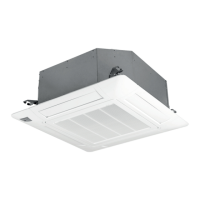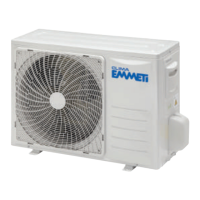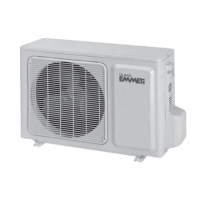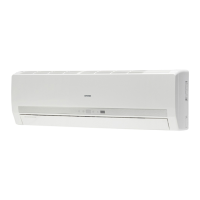Do you have a question about the emmeti X-REVO 19 W Series and is the answer not in the manual?
| Brand | emmeti |
|---|---|
| Model | X-REVO 19 W Series |
| Category | Air Conditioner |
| Language | English |
Explains the purpose of air conditioners for creating comfortable environments.
Details the four stages of the refrigeration cycle: Evaporation, Compression, Condensation, Expansion.
Describes the "Split System" with indoor and outdoor units and remote control activation.
Identifies components like front panel, display, deflectors, air filter, and emergency button.
Explains how temperature is displayed in different modes (AUTO, COOL, HEAT, FAN, DRY).
Lists the quantity and items included with the indoor unit, like remote control and batteries.
Identifies key parts of the outdoor unit: air inlet/outlet grille, electrical connection, pipe connections.
Provides tables to identify models based on type, potentiality, and unit configuration.
General warnings, symbols meaning, user responsibility, and safety notices for installation/maintenance.
More warnings about device malfunction, maintenance, abnormal phenomena, blocking grids, and installation near sources.
Lists European standards and directives the air conditioners comply with.
Explains IP ratings for indoor (IPX0) and outdoor (IP24) units regarding solid objects and water ingress.
Details about R32 refrigerant, GWP, and labeling requirements.
Provides operating temperature limits (Cooling/Heating) for various outdoor unit models.
Safety data for R32, including physical hazards, first aid, firefighting, and handling.
Instructions for careful unpacking to avoid damaging the unit and checking for integrity.
Guidance on moving units using pre-cut handles and following work safety laws.
Specific instructions for moving heavy units, including using a forklift and suspension methods.
General guidelines for placing units in well-ventilated areas, avoiding specific locations and ensuring proper airflow.
Specifies required minimum clearances around the indoor unit for optimal airflow and performance.
Provides physical dimensions (width, height, depth) for various indoor unit models.
Details the dimensions and placement of the mounting plate for 09 and 12 kBtu models.
Details the dimensions and placement of the mounting plate for 18 kBtu models.
Details the dimensions and placement of the mounting plate for 24 kBtu models.
States that installation and maintenance must be performed by qualified and authorized personnel.
Instructions on how to fix the installation template and prepare the wall for pipe passage.
Guidance on securely fixing the indoor unit onto the installation template and how to remove it.
Step-by-step instructions for connecting refrigerant pipes to the indoor unit, including tool usage.
Instructions for connecting and routing the condensate drain pipe, noting proper installation and potential issues.
General information on electrical connections, mandatory bipolar switch, and power supply considerations.
Specifies required cable types, sections, and standards for power supply connections up to 15m.
Step-by-step guide to connecting the indoor unit's power supply to the terminal block.
Guidance on securing connection cables, drain pipe, and refrigerant pipes together with protective tape.
Wiring diagram for connecting a single indoor unit (monosplit) to the outdoor unit.
Wiring diagrams for connecting dual, trial, and quadrial indoor units to the outdoor unit.
Explains the function of each button on the remote control for operating the air conditioner.
Explains the meaning of various icons and indicators displayed on the remote control's LCD screen.
Step-by-step instructions for inserting batteries into the remote control.
Precautions for using the remote control, avoiding obstructions and environmental hazards.
Notes on compressor protection (restart delay) and heating function cold current prevention.
How to operate the unit in fan-only mode and select desired fan speeds (High, Medium, Low).
Instructions for operating the unit in cooling mode, setting desired temperature, and fan speed.
How to operate the unit in heating mode, set desired temperature, and fan speed, including automatic defrosting.
Instructions for operating the unit in dry mode for dehumidification and adjusting temperature settings.
How to use the automatic mode, which selects operation mode and temperature based on room conditions.
Explains automatic and manual adjustment of vertical and horizontal airflow direction using the remote control.
Step-by-step guide to setting the current time on the remote control and indoor unit display.
Instructions on how to set the timer for automatic ON operation of the air conditioner.
Explanation of the SLEEP mode and its different settings for cooling and heating temperature adjustments.
How to activate/deactivate the SUPER mode for rapid cooling or heating operations.
How to activate the QUIET mode for low noise emission operation.
How to activate ECONOMY mode for low power consumption operation.
How to use the iFEEL function for temperature sensing via the remote control for ideal comfort.
How to switch the display/lights on/off and lock/unlock the remote control keypad.
Explains the automatic restart function after power interruptions and the emergency stop button.
Advice on heating efficiency and room temperature rise time for heat pump systems.
General tips for correct operation to aid maintenance, like setting temperature and using timers.
Critical safety warning to disconnect power before performing any maintenance operations.
Instructions for cleaning the remote control using a dry cloth only.
How to clean the indoor unit, including warnings against using certain cleaning agents or sprays.
How to clean the outdoor unit and its air inlet/outlet grilles periodically.
Instructions on how to clean the air filters to maintain unit efficiency and air quality.
Guidance on checking condensation water outflow and contacting service if no water drains.
Steps for preparing the unit for long inactivity and restarting it afterwards.
Recommends professional sanitizing and system checks for optimal performance and longevity.
Lists common defects like unit not starting, no beep, display fading, and their potential causes.
Addresses issues with insufficient cooling or heating and their potential causes like filters or environment.
Discusses causes of unpleasant odors, operational noises, and ineffective control issues.
Lists error codes displayed on the indoor unit and their corresponding meanings and causes for diagnostics.
Information on the disposal of electrical equipment, packaging, and batteries according to regulations.
Guidelines for safely disposing of the old air conditioner, emphasizing refrigerant handling and environmental protection.
Detailed circuit diagram for indoor units, showing connections for control unit, heat exchanger, and motors.
Instructions for installing the optional Wifi module for smartphone control of the air conditioner.
How to connect a window/presence sensor to the indoor unit control board for operational control.
Details factory settings and procedures for configuring the window/presence contact input.
Details warranty coverage for manufacturing defects and lists exclusions like tampering and negligence.
Covers warranty duration, claim reporting, legal terms, and jurisdiction for disputes.
Clarifies payment obligations and excludes compensation for periods of unit downtime.
Form for the end-user to keep, requiring model and installation details for warranty validation.
Form for the distributor, requiring user, installer, and service details for warranty tracking.
Form for the installer, requiring user, distributor, and service details for warranty validation.










